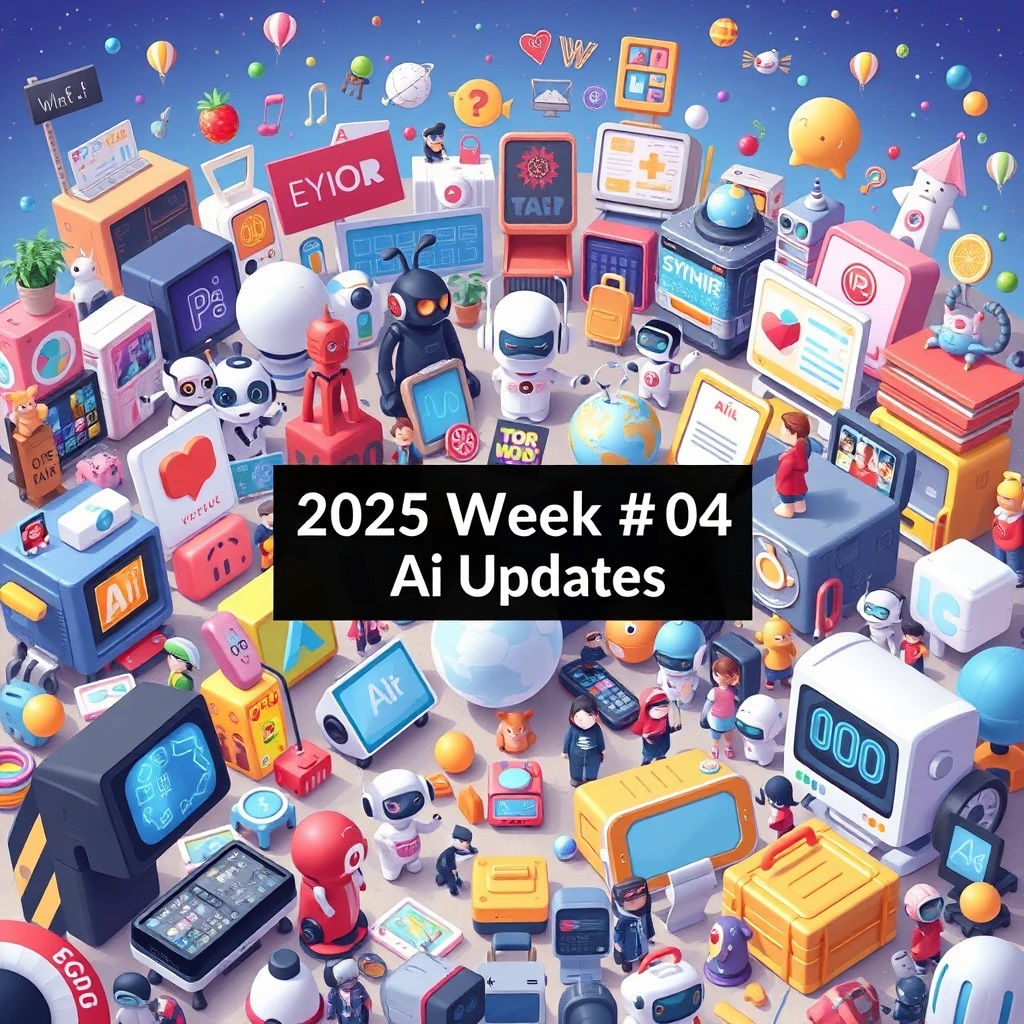Last Updated on January 29, 2025 by Editor
This week (January 22 to January 28, 2025) in artificial intelligence has been marked by significant advancements and strategic shifts across the industry. Major players like OpenAI and Alibaba are redefining their approaches to business applications and competitive positioning, while ethical discussions surrounding AI’s role in military and healthcare sectors continue to gain prominence. As innovations unfold, the landscape of AI remains dynamic and increasingly intertwined with global challenges and opportunities.
Key Takeaways
- OpenAI’s Business Focus: OpenAI is shifting its strategy to target the business sector with advanced AI tools, aiming to enhance productivity and streamline operations.
- Global AI Influence: AI technologies are increasingly being leveraged to tackle global challenges, such as climate change and public health, highlighting both opportunities and ethical considerations.
- Military AI Contracts: Google has secured a contract with the Israel Defense Forces (IDF), raising ethical discussions about the implications of AI in military operations.
- Alibaba’s Competitive Edge: Alibaba’s launch of Qwen 2.5 Max positions it as a serious competitor to U.S. tech giants in the enterprise AI market, emphasizing the globalization of AI technology.
- Accessible AI Development: Jack Dorsey’s introduction of Goose, an open-source platform for building AI agents, aims to democratize access to AI development tools.
- Enhanced XR Experiences: Haptikos unveiled a hand exoskeleton that enhances interactions in extended reality (XR) environments, bridging physical and digital experiences.
- User-Generated Content Innovation: Pocket Worlds’ acquisition of Infinite Canvas focuses on integrating AI into user-generated content creation, enhancing interactivity and creativity.
- Prosocial AI Advocacy: The importance of a prosocial AI framework is emphasized for responsible development and deployment, promoting ethical outcomes in technology.
- Funding for Sales Automation: Y Combinator’s Origami Agents secured $2 million in seed funding to develop intelligent sales agents that automate tasks and provide insights.
- Healthcare Advancements: Meta’s BrightHeart initiative is using Dinov2 technology to improve fetal heart screenings, showcasing AI’s potential in enhancing healthcare diagnostics.
- EU AI Act Compliance Challenges: HolisticAI highlights potential penalties under the EU AI Act, stressing the need for organizations to align with regulatory requirements in their AI deployments.
DeepSeek’s R1 Model Disrupts AI Landscape, Dethrones ChatGPT
DeepSeek, a Chinese AI startup, has made headlines by launching its R1 reasoning model, which has quickly ascended to the top of app stores, surpassing OpenAI’s ChatGPT. Analysts attribute this shift to the affordability and performance of DeepSeek’s model compared to its competitors, raising concerns about the sustainability of valuations in the AI sector. DeepSeek’s R1 model is reported to outperform existing models in various metrics while being developed at a fraction of the cost—estimated at around $600,000—compared to other leading models like Meta’s Llama. This cost efficiency has sparked discussions about the implications for U.S. tech companies and their dominance in the AI space.
Nvidia Faces Major Market Setback Amid DeepSeek Surge
Nvidia, a leader in AI chip manufacturing, experienced a staggering 17% decline in its stock value following the rise of DeepSeek’s R1 model, erasing approximately $600 billion from its market capitalization. This downturn represents one of the largest single-day market cap losses in history, prompting widespread concern among investors about the future competitiveness of established tech giants against emerging players like DeepSeek. The market reaction underscores the volatility within the tech sector as investors reassess valuations amid rapid advancements from new entrants. Former President Donald Trump referred to this situation as a “wake-up call” for American tech firms, suggesting that it may catalyze innovation and strategic shifts within the industry.
DeepSeek Halts User Sign-Ups Amid Cyber Attack
DeepSeek, a rapidly rising Chinese AI platform, has temporarily paused new user registrations due to large-scale malicious attacks targeting its services. The company announced that sign-ups would be limited exclusively to users with China-based phone numbers (+86) as it works to stabilize its operations following these disruptions. Existing users can still access their accounts without issue, but the incident highlights vulnerabilities faced by emerging tech platforms amidst growing demand. These updates collectively illustrate a dynamic landscape in AI development, characterized by significant investments, innovative product launches, and emerging challenges related to security and funding. As companies navigate these complexities, their strategies will likely shape the future trajectory of artificial intelligence across various sectors.
Italy Raises Data Privacy Concerns Over DeepSeek
In a significant move, Italy’s Data Protection Authority (DPA) has issued a formal request for information regarding DeepSeek’s data handling practices. The complaint arises from concerns that the personal data of millions of Italians may be at risk due to the company’s operations, which are based in China. The DPA is seeking clarity on what personal data is collected, how it is processed, and whether it complies with GDPR regulations. This inquiry marks a pivotal moment for DeepSeek as it navigates potential regulatory challenges in Europe. The Italian DPA has given DeepSeek 20 days to respond to its information request, emphasizing the urgency of addressing these privacy issues amidst growing scrutiny of AI technologies globally.
Hugging Face Launches Open-R1 Project to Foster Transparency
In response to DeepSeek’s proprietary approach with its R1 model, researchers at Hugging Face have initiated the Open-R1 project aimed at creating an open-source version of DeepSeek’s reasoning model. This initiative seeks to democratize access to AI technologies by providing transparency in model architecture and training processes. Hugging Face’s efforts highlight a growing demand for open-source alternatives in an industry increasingly characterized by “black box” models that lack transparency. The project aims not only to replicate R1 but also to facilitate further research and innovation within the AI community, emphasizing the importance of openness in advancing responsible AI deployment.
Meta Integrates User Data for Enhanced AI Personalization
Meta has announced that its AI systems can now utilize data from Facebook and Instagram users to personalize responses more effectively. This integration aims to enhance user engagement and improve the overall experience with Meta’s AI offerings. As competition intensifies with models like DeepSeek’s R1 gaining traction, established companies are increasingly leveraging their vast user data pools to refine their AI capabilities. This move reflects a broader trend where companies are prioritizing personalized interactions as a key differentiator in the crowded AI marketplace.
SoftBank to Invest $500 Million in Robotics Startup Skild AI
SoftBank Group Corp. is in advanced talks to lead a $500 million funding round for Skild AI, a robotics software startup founded in 2023 by Carnegie Mellon professors Deepak Pathak and Abhinav Gupta. The new investment would value the company at $4 billion, a significant leap from its $1.5 billion valuation last year, which included backing from prominent investors like Jeff Bezos, Lightspeed Venture Partners, and Coatue Management. Skild AI specializes in developing foundational AI models for robotics, enabling robots to perform complex tasks across industries. This funding reflects growing optimism about the intersection of AI and robotics, with SoftBank positioning itself as a major player in this domain. The move aligns with SoftBank’s broader strategy, which includes its commitment to the Stargate project and other AI ventures.
OpenAI’s Stargate Project Faces Funding Challenges
OpenAI’s ambitious Stargate Project, aimed at building extensive data centers in the U.S., is reportedly struggling to secure the necessary funding. According to a Financial Times report, while the project is backed by major investors like SoftBank and the Middle East AI fund MGX, it has not yet developed a comprehensive financial plan. Initial commitments from OpenAI and SoftBank are over $15 billion each, but they face challenges in raising the total projected cost of $100 billion to $500 billion. Elon Musk has publicly criticized the project, suggesting it lacks the financial backing it claims, which has reportedly caused tension within the White House.
Reliance Plans to Build World’s Largest AI Data Center in India
Mukesh Ambani’s Reliance Industries is set to construct what could become the world’s largest AI data center in Jamnagar, India. With a projected capacity of three gigawatts, this facility aims to surpass Microsoft’s current largest data center in Virginia, which has a capacity of 600 megawatts. The estimated cost for this monumental project ranges between $20 billion and $30 billion. Reliance intends to power the data center primarily through renewable energy sources from an adjacent green energy complex. This initiative aligns with Reliance’s broader strategy to dominate India’s telecom and retail sectors while meeting surging AI demands.
OpenAI Launches Operator: An Autonomous AI Agent
OpenAI has unveiled Operator, an AI agent designed to perform tasks autonomously across various applications. This tool aims to enhance productivity by automating routine tasks for users. Additionally, OpenAI has stated that it may retain data from Operator for up to 90 days after deletion, compared to its 30-day retention policy for ChatGPT. This extended retention period raises questions about user privacy and data management practices within OpenAI’s ecosystem. OpenAI has announced that its Operator tool will be accessible to users subscribing at a rate of $200 per month for pro features. This pricing strategy aims to monetize advanced functionalities within its AI offerings while providing users with enhanced capabilities for task automation and management. The introduction of this subscription model indicates OpenAI’s commitment to developing premium services tailored for professional environments.
Perplexity Launches Assistant for Android Users
Perplexity has introduced a new assistant specifically designed for Android users, expanding its reach in the mobile market. This launch reflects a growing trend among AI companies to cater to mobile users who seek assistance and information on-the-go. The assistant aims to provide seamless integration with Android devices, enhancing user experience through personalized interactions and real-time information retrieval.
Neko Secures $260 Million Funding at $1.8 Billion Valuation
Neko, a body-scanning startup co-founded by Spotify’s Daniel Ek, has raised $260 million in funding at a valuation of $1.8 billion. This investment underscores growing interest in technologies that leverage AI for personalized health and wellness applications. Neko aims to revolutionize how individuals interact with their body data, potentially impacting sectors like fitness and healthcare significantly.
Ericsson Launches Cognitive Labs for Telecom AI Innovations
Ericsson has announced the establishment of Cognitive Labs, a virtual research hub focused on advancing AI technologies within telecommunications. This initiative will explore innovative applications such as Graph Neural Networks (GNNs) and Large-Scale Language Models (LLMs), aiming to enhance mobile communication systems and expand into areas like healthcare and energy efficiency. By fostering collaboration across global teams, Ericsson seeks to position itself at the forefront of telecom innovation.
OpenAI Targets Business Sector with Advanced AI Tools
OpenAI is shifting its focus towards the business sector by developing advanced AI tools tailored for enterprise applications. This initiative aims to enhance productivity and streamline operations within organizations, leveraging AI capabilities to address specific industry needs. OpenAI’s strategy reflects a growing trend among tech companies to provide customized solutions that can integrate seamlessly into existing business workflows.
BBC Report Highlights AI’s Role in Global Issues
A recent BBC article discusses the increasing influence of AI technologies on global challenges, including climate change and public health. The report emphasizes how AI can be harnessed to analyze vast datasets, enabling more informed decision-making and innovative solutions to pressing problems. The discussion highlights the dual nature of AI’s impact, presenting both opportunities and ethical considerations that must be navigated.
Google Partners with Israel Defense Forces for AI Contract
Google has secured a contract with the Israel Defense Forces (IDF) to provide advanced AI technologies aimed at enhancing military operations in Gaza. This partnership underscores the growing intersection between tech companies and defense sectors, raising discussions about ethical implications and the role of AI in warfare. Critics have voiced concerns over the potential misuse of such technologies in conflict zones.
Alibaba’s Qwen 2.5 Max Challenges U.S. Tech Giants
Alibaba has launched its Qwen 2.5 Max model, positioning it as a competitor to established U.S. tech giants in the enterprise AI space. This new offering aims to provide businesses with robust AI solutions that can rival those from companies like OpenAI and Google. Alibaba’s entry into this competitive landscape highlights the increasing globalization of AI technology and its implications for market dynamics.
Jack Dorsey Introduces Goose: A Simple AI Agent Platform
Jack Dorsey has unveiled Goose, an ultra-simple open-source platform designed for building AI agents. This new initiative from his startup Block aims to democratize access to AI development tools, enabling users to create their own agents without extensive technical knowledge. Goose represents a significant step towards making AI more accessible to a broader audience.
Haptikos Unveils Hand Exoskeleton for XR Experiences
Haptikos has introduced a hand exoskeleton designed for immersive experiences in extended reality (XR). This innovative device allows users to interact with digital objects more naturally, enhancing engagement in virtual environments. The exoskeleton aims to bridge the gap between physical and digital interactions, paving the way for more intuitive user experiences in gaming and other applications.
Pocket Worlds Acquires Infinite Canvas for AI-Based UGC
Pocket Worlds has acquired Infinite Canvas, a team specializing in AI-driven user-generated content (UGC) creation. This acquisition aims to bolster Pocket Worlds’ capabilities in developing interactive digital environments, leveraging AI to enhance user creativity and engagement. The move reflects a broader trend towards integrating advanced technologies into content creation processes.
VentureBeat discusses the importance of prosocial AI as a framework for designing, deploying, and governing artificial intelligence systems. Advocates argue that prioritizing social good in AI development can lead to more ethical outcomes and mitigate potential harms associated with misuse or bias in technology. The conversation emphasizes the need for collaborative efforts among stakeholders to establish guidelines that promote responsible innovation.
Y Combinator’s Origami Agents Secures $2M Seed Round
Origami Agents, one of Y Combinator’s standout startups, has successfully raised $2 million in seed funding to enhance sales teams through AI technology. The startup focuses on developing intelligent agents that can assist sales professionals by automating tasks and providing insights, thereby improving efficiency and effectiveness within sales processes.
BrightHeart Transforms Fetal Heart Screenings with Dinov2
Meta’s BrightHeart initiative is utilizing Dinov2 technology to revolutionize fetal heart screenings. This advancement aims to improve diagnostic accuracy and accessibility for expectant mothers, showcasing how AI can significantly impact healthcare practices. The integration of such technologies reflects ongoing efforts to leverage artificial intelligence in enhancing patient care and outcomes.
HolisticAI Discusses EU AI Act Penalties
HolisticAI has published an analysis on potential penalties outlined in the EU AI Act, emphasizing compliance challenges for organizations operating within Europe. The article explores how strict regulations could impact businesses deploying AI technologies, urging companies to prioritize ethical considerations alongside technological advancements. The discussion highlights the necessity for proactive measures to align with evolving regulatory landscapes. These summaries encapsulate key developments across various sectors influenced by artificial intelligence, reflecting both opportunities and challenges as organizations navigate this rapidly evolving landscape.
As we reflect on the key developments in artificial intelligence this week, it is clear that the sector is rapidly evolving, with new technologies and ethical considerations shaping its future. From OpenAI’s targeted business strategies to the implications of military contracts and healthcare innovations, the landscape is both exciting and complex. Stay tuned for next week as we continue to explore the latest trends, breakthroughs, and discussions that are driving the AI narrative forward.




